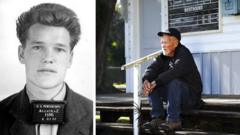Charlie Hopkins, the last living inmate of Alcatraz, made headlines recently with his reflections on the notorious prison in light of President Trump's ambitious proposal to reopen it as a federal facility. Now at 93 years old, Hopkins recalls the "deathly quiet" of his three years on the isolated island when he was confined there as part of a 17-year sentence for kidnapping and robbery.
Sentenced in 1955, Hopkins remembers the stark environment of Alcatraz: clean yet barren, with no distractions and little to do. "There was nothing to do," he revealed, noting that his activities were limited to walking in his cell and doing push-ups, or keeping the prison clean through his assigned job. Alcatraz, once home to infamous figures like Al Capone and Robert Stroud, became a place of both camaraderie and terror for Hopkins, who even attempted to help a few prisoners escape.
In a recent interview with BBC, Hopkins lamented Trump's plans for the prison, expressing doubts about the practicality of reopening such a decrepit facility, which has suffered from years of decay. Experts echo his concerns, emphasizing that bringing Alcatraz up to contemporary prison standards would require significant financial investment—a reality that challenges the narrative of reopening the island.
Despite his earlier troubles, including multiple attempts to escape that earned him solitary confinement, Hopkins aspires to share his journey through a memoir, reflecting on a life transformed by time spent behind bars. Although he has since returned to his home state of Florida, the memories of Alcatraz, surrounded by chilling waters, remain indelibly etched in his mind.
Hopkins, however, perceives Trump's proposal as more of a political gesture than a serious policy plan. "He don't really want to open that place," Hopkins states, suggesting the president’s remarks serve to underscore a toughness on crime rather than an actionable proposal. With a keen understanding of the prison's dark history and his own path to redemption, Hopkins offers a thoughtful perspective on both the past and future of America's complex relationship with incarceration.


















